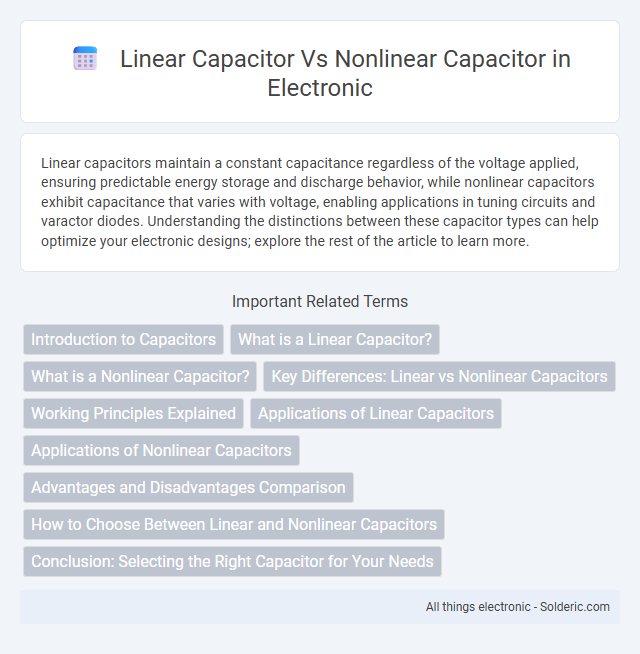Linear capacitors maintain a constant capacitance regardless of the voltage applied, ensuring predictable energy storage and discharge behavior, while nonlinear capacitors exhibit capacitance that varies with voltage, enabling applications in tuning circuits and varactor diodes. Understanding the distinctions between these capacitor types can help optimize your electronic designs; explore the rest of the article to learn more.
Comparison Table
| Feature | Linear Capacitor | Nonlinear Capacitor |
|---|---|---|
| Capacitance Behavior | Constant capacitance regardless of voltage | Capacitance varies with applied voltage |
| Voltage-Current Relationship | Linear (I = C dV/dt) | Nonlinear, dependent on voltage level |
| Applications | Basic filtering, timing circuits, energy storage | Varactors in tuning circuits, voltage-controlled oscillators |
| Material Type | Dielectric materials with stable permittivity | Semiconductor junctions or nonlinear dielectrics |
| Frequency Response | Predictable across wide frequency range | Frequency dependent, affected by voltage variations |
| Energy Storage | Proportional to constant capacitance | Variable energy storage based on capacitance changes |
Introduction to Capacitors
Capacitors store electrical energy by accumulating charge on two conductive plates separated by a dielectric material. Linear capacitors have a constant capacitance value regardless of the applied voltage, making their behavior predictable in circuits. Your choice between linear and nonlinear capacitors depends on the specific application requirements, as nonlinear capacitors exhibit capacitance that varies with voltage, enabling advanced functionalities in tunable and sensor circuits.
What is a Linear Capacitor?
A linear capacitor is an electrical component whose capacitance remains constant regardless of the applied voltage or frequency, ensuring a predictable and stable response in circuits. It stores energy in an electric field between two conductive plates separated by a dielectric material, following a linear relationship between charge and voltage. Your choice of a linear capacitor is ideal for applications requiring consistent performance, such as filtering, timing, and signal processing circuits.
What is a Nonlinear Capacitor?
A nonlinear capacitor exhibits a capacitance that varies with the applied voltage or electric field, unlike a linear capacitor which maintains a constant capacitance regardless of voltage changes. This behavior arises from materials with voltage-dependent dielectric properties or structures causing capacitance to change non-proportionally to the voltage. Nonlinear capacitors are critical in applications like varactors for voltage-controlled oscillators, tunable filters, and frequency multipliers in RF and microwave circuits.
Key Differences: Linear vs Nonlinear Capacitors
Linear capacitors maintain a constant capacitance regardless of the applied voltage, ensuring predictable energy storage and discharge behavior in circuits. Nonlinear capacitors exhibit capacitance that varies with voltage, enabling voltage-dependent tuning and filtering functions in applications like varactors. Your choice between linear and nonlinear capacitors depends on whether stable capacitance or voltage-responsive performance is critical for your electronic design.
Working Principles Explained
Linear capacitors operate with a constant capacitance value, meaning their charge-voltage relationship follows a direct proportionality based on a fixed dielectric material, enabling predictable energy storage. Nonlinear capacitors exhibit capacitance that varies with the applied voltage or electric field, often due to materials like ferroelectrics whose permittivity changes under different conditions. Understanding these working principles helps you select the appropriate capacitor type for applications requiring stable or variable capacitance responses.
Applications of Linear Capacitors
Linear capacitors are widely used in applications requiring stable and predictable capacitance values, such as filtering, timing circuits, and energy storage in power supplies. Their consistent linear behavior under varying voltage conditions makes them ideal for signal processing in audio equipment and radio frequency circuits. These capacitors also play a crucial role in precision measurement devices where accuracy and reliability are essential.
Applications of Nonlinear Capacitors
Nonlinear capacitors find critical applications in frequency tuning circuits, voltage-controlled oscillators, and RF filters due to their voltage-dependent capacitance properties. These capacitors enable precise control over signal frequencies in wireless communication devices and adaptive electronic systems, enhancing performance and efficiency. You can optimize circuit functionality by integrating nonlinear capacitors where dynamic capacitance variation is essential.
Advantages and Disadvantages Comparison
Linear capacitors offer predictable and stable capacitance values over a wide voltage range, making them ideal for precise filtering and timing applications. Nonlinear capacitors, such as varactors, provide voltage-dependent capacitance, enabling tunable circuits like voltage-controlled oscillators but suffer from distortion and non-ideal behavior at high frequencies. The primary disadvantage of linear capacitors is limited tunability, whereas nonlinear capacitors trade consistency for adaptability, impacting overall signal fidelity.
How to Choose Between Linear and Nonlinear Capacitors
Choosing between linear and nonlinear capacitors depends on the specific application requirements, such as voltage stability and signal distortion tolerance. Linear capacitors provide consistent capacitance regardless of voltage changes, making them ideal for high-frequency filters and oscillators. Nonlinear capacitors, which vary capacitance with applied voltage, are suitable for tuning circuits and voltage-controlled oscillators where variable capacitance enhances performance, so your choice should align with the need for stability versus tunability.
Conclusion: Selecting the Right Capacitor for Your Needs
Choosing the right capacitor depends on your application's voltage and frequency characteristics; linear capacitors offer predictable performance with constant capacitance, ideal for standard filtering and timing circuits. Nonlinear capacitors provide voltage-dependent capacitance, which is essential in tuning circuits and voltage regulation where capacitance must vary with signal levels. Your selection should prioritize stability requirements and operational conditions to ensure optimal circuit functionality and efficiency.
linear capacitor vs nonlinear capacitor Infographic

 solderic.com
solderic.com